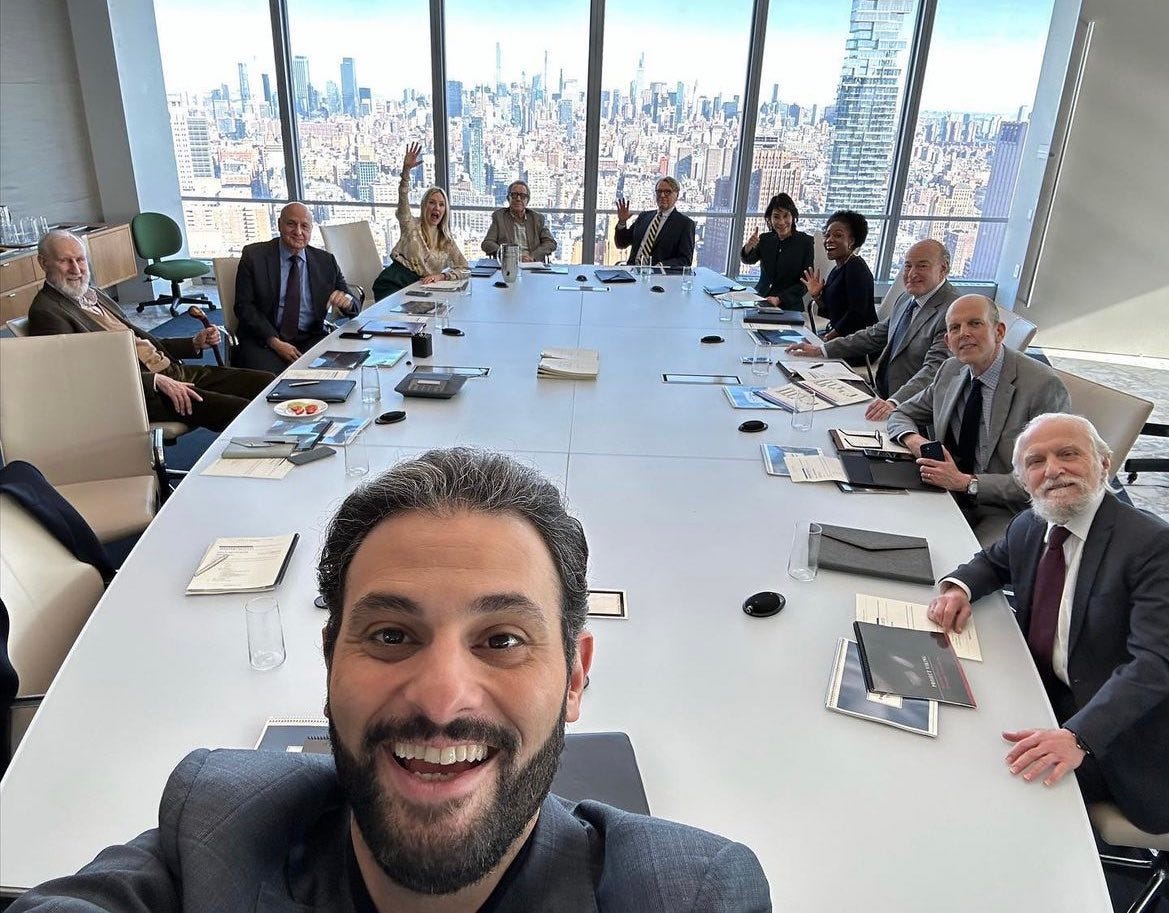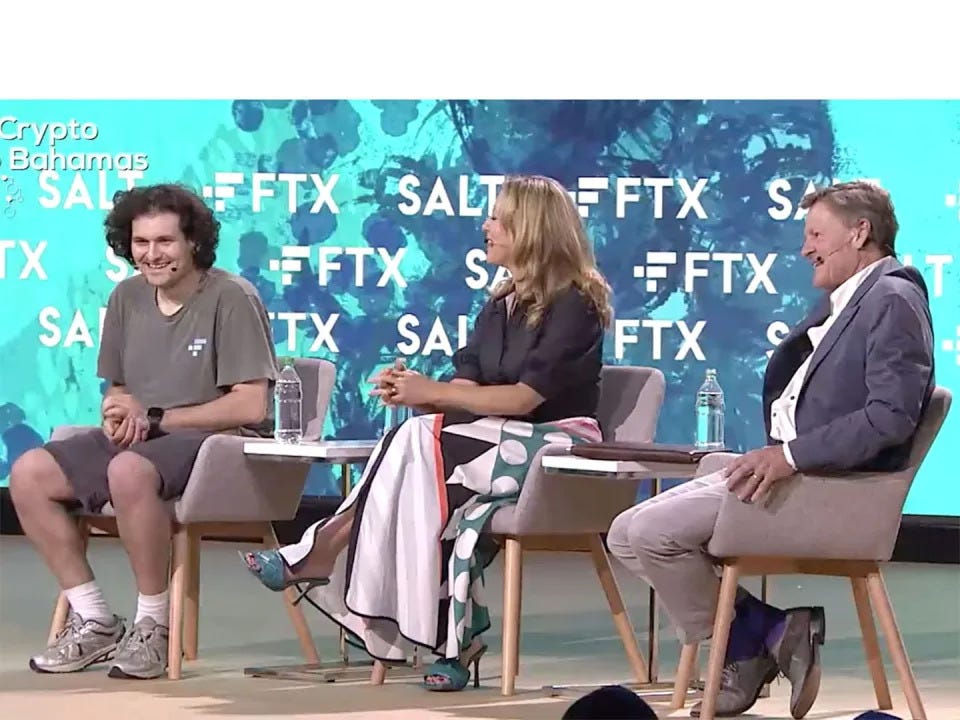Hello Searchers,
In this week’s newsletter, I will once again remind you about the ZOOM MEETING FOR PAID SUBSCRIBERS NEXT FRIDAY. I will tell you about our new story, and provide quite a bit of further reading on this week’s subject, which we have become very fascinated by. I also will provide Franck’s email address (ftgermain12@gmail.com) in case you are looking to hire someone for your content consumption.
Also, in our very short book review corner, a quick thought on the Michael Lewis book about Sam Bankman-Fried, Going Infinite, which I read faster than any book I’ve read this year. Plus, some extra material from the episode.
First, the episode
The Fond Du Lac Apartment Mystery
Why would the government give Korianne a free coupon for an apartment she can’t find? We have a question from a listener who finds herself very lost in Wisconsin. And we have a bonus question, from the internet’s own Taylor Lorenz. What happens when you pay someone else to surf your internet?
This was one of the first listener questions we recorded for the show, back when we were piloting in the Spring. When we took it on, I was running a little experiment in my own mind which was – is it a good idea for this show to try to answer highly specific listener questions?
I generally believe that specific and personal questions can lead to interesting and universal answers (good) but they can also be a little harder to report, which can be time-taxing (bad). So, I wanted to see how this would go.
I feel really proud of how this one turned out, but we’ll know more when we hear from you all. The show exists in conversation with its listeners.
One of the discoveries we’ve made as we learn what Search Engine is, is that the show pleases us when its questions send us into wonkier waters.
An idea I’ve been thinking about a lot (it came up in an interview with Ezra Klein we haven’t yet published) is how podcasting, as a form, might be able to tolerate more patience for complexity than some other parts of the internet right now. We’re trying to learn how far we can lean into that, and who will follow us there.
We’ll see. Anyway, we hope you enjoy this week's episode. We’ve also got some sillier and simpler episodes coming up to make sure we never do too much of any one thing.
Next week: Search Engine Board Meeting
This is your final warning.
Next Friday, October 13th, at 12PM eastern time.
The year’s first SEARCH ENGINE BOARD MEETING.
What this means is, if you’re a paid subscriber to the podcast, you will get an email that morning with a Zoom link. We will do a Zoom meeting for an hour, I’ll take moderated questions and provide unmoderated answers. The rest of the Search Engine team will be there, too.
If you’re not yet a member and want to sign up, you can do it below:
There will not be a recording of the event! So come eat lunch (or breakfast, or dinner, depending on where you live) with us… or be condemned, forever, to wonder what you missed. If you missed the button two sentences ago, don’t worry, it’s right here too:
Some people have asked about one-time donations. Substack, as a platform, doesn’t allow it, but if you want, you can just sign up and then immediately cancel, which will send us money and also put you on the paid subscriber list for the month.
Also, of course, if you want to attend and can’t afford to, please send me an email and we’ll figure something out.
Search Engine Book Review Corner
Last week, we talked to Zeke Faux about Sam Bankman-Fried, and recommended Zeke’s book about crypto’s rise and fall, Number Go Up. The recommendation stands, the book is wonderful. It’s the story of a skeptical financial journalist journeying through crypto, fact-checking the wild claims of many scoundrels and possible scoundrels while maintaining his sense of humor.
This year, the most anticipated Sam Bankman-Fried tome has been the one by Michael Lewis, Going Infinite. Lewis was following Sam Bankman-Fried for much of last year. He appeared for a moment in our story last week, in a scene that found him onstage at Sam's conference, asking Sam a relatively fawning question.
My pre-order of Going Infinite arrived this week, and I ripped through it. I’ve had a great reading year, but I’ve yet to read anything this fast. I started it Wednesday evening, a bit sleepy after work. I stayed up late, woke up early, and finished it Thursday morning.
Lewis can tell a story. He also has a different, more-compassionate-than-consensus take on SBF, which has earned him a decent amount of ire online. Depending on what evidence emerges at trial, there’s a very possible world in which Michael Lewis will end up looking overly credulous, and in that world, the ire-havers will dunk on him a lot. But watching all the ire, I feel, not for the first time, out of step with the internet.
I think one of the current internet’s less well-documented downsides is that many pieces of culture are evaluated solely on the basis of how well they serve as evidence in someone else’s ongoing argument.
I don’t really evaluate writers based on whether or not I agree with them. And I don’t care that much whether Michael Lewis believes, half-believes, or doesn’t at all believe that Sam Bankman-Fried should be in jail. Or for how long. I would care more if he were a juror in the case. Instead, he’s a person who wrote a book.
The book contains a lot of new reporting. The book made me understand parts of the world I didn’t understand as well before. I learned more about life inside trading firms like Jane Street Capital, and about the bizarre new culture of this generation of financial traders. I also better understand Effective Altruism, and how some people in the movement went from worrying about mosquito nets to worrying about more outlandish threats to humanity.
Going Infinite also gave me the main experience I look for in anything I read, fiction or nonfiction, which is just a deeper understanding of other human beings in all of their strangeness. I believe I now know what life looks like from the perspective of a person, SBF, who sees the world mainly as a series of games. I know what it’s like for that person to win more games than anyone else, and then to lose, enormously, and to learn, too late, that his life was not a game, and that life’s consequences, for him and countless other people, are terribly real.
That experience, of understanding a stranger, maybe two strangers, through printed words, is the only experience I’ve ever discovered that can reliably make me feel less alone in my own mind. It’s all I ever look for. I don’t know. I’m happy to revise this view if, today or next week at the trial, some new testimony shows that Michael Lewis was extremely badly snowed by Sam Bankman-Fried, and I think that’s what a lot of the ire-having people online expect.
But for me, for now, watching Michael Lewis try very hard to understand Sam Bankman-Fried felt like a good use of my time. I liked the book.
Further material from the episode
Hope on the Block - the community pantries non-profit that Korianne mentioned
The Voucher Promise - Eva Rosen
The Pruitt-Igoe Myth (documentary)
Administrative Burden: Policymaking by Other Means by Pamela Herd and Donald P. Moynihan







Hi PJ—I’ve listened to your shows for years and think very highly of your reporting, and I love Search Engine! I was really glad to see an episode housing subsidies. You did say one thing on the show that I had to comment on—and I’m sure I won’t be the only one to point out. When talking about making the Sxn 8 program an entitlement you said something to the effect of “entitlements mean no one has to jump through hoops.” Entitlement programs, like SNAP and Medicaid, actually have huge administrative burdens and people struggle to get the programs they’re entitled to all the time. Check out an article in the Atlantic called the Time Tax for some info if you’re interested. I’m taking the time to correct this misconception because I think it plays into the broader narrative of “government hand outs” and how easy it is for people to lie and get benefits, going all the way back to the racist and damaging idea of “welfare queens”. In reality, these programs are complex and often difficult to access, even for the most deserving, and there’s usually no help available for those who need it. As an anti poverty attorney, it’s something I think about a lot!
Anyway—thanks for the great reporting and great show! Already looking forward to the next one!
> But for me, for now, watching Michael Lewis try very hard to understand Sam Bankman-Fried felt like a good use of my time. I liked the book.
Very interesting, I've noticed the Lewis-dunking too and was curious about that. This tips me towards wanting to read for myself, having enjoyed many of Lewis's books before. Thanks.